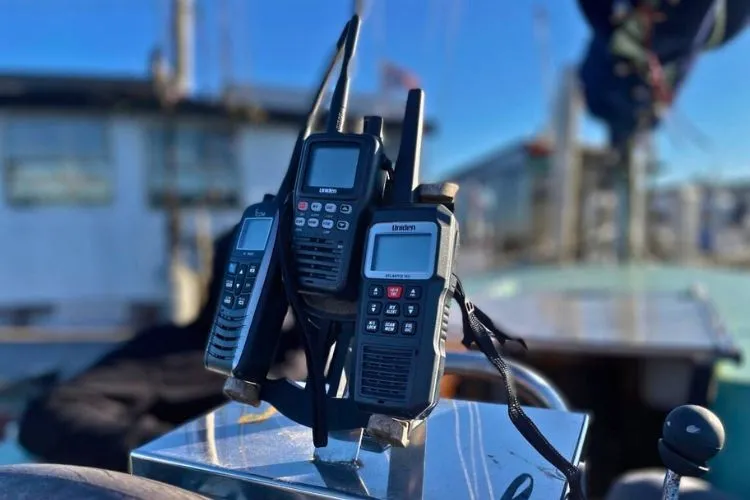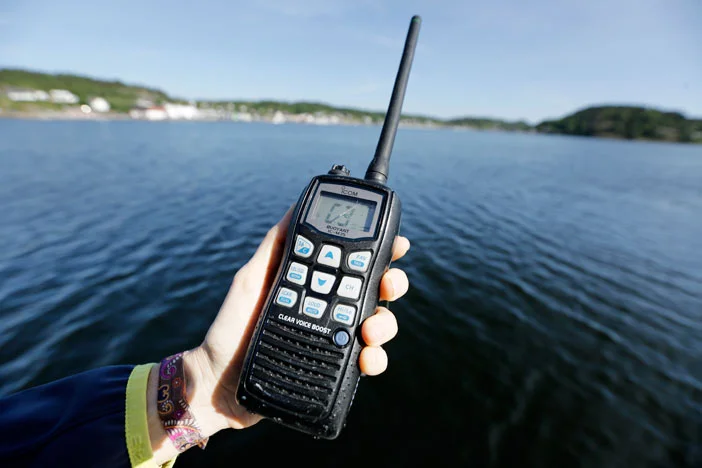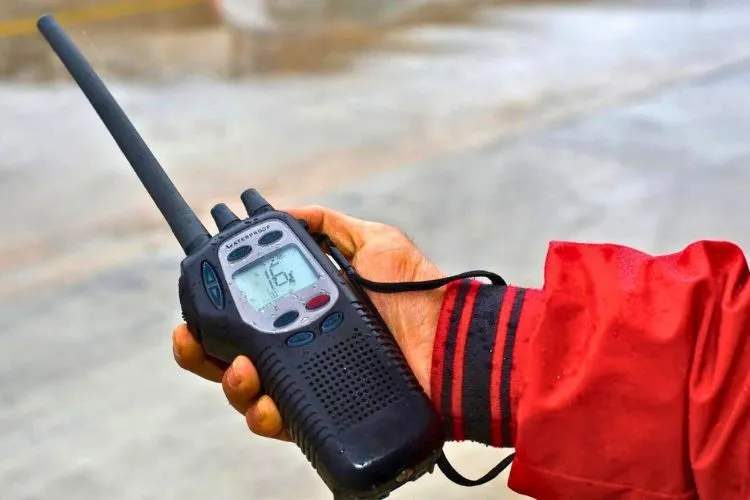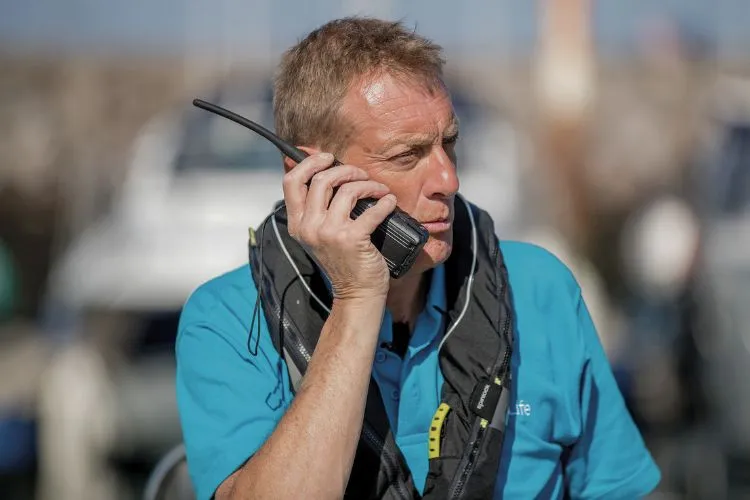In the realm of maritime adventures and professions, VHF radios stand as crucial tools for communication.
The question of whether these devices are waterproof remains top of mind for many.
So, are VHF radios waterproof for real?
Let’s dive into the specifics of waterproof VHF radios, decoding terminology, understanding ratings, and exploring the options available in today’s market.

What Does ‘Waterproof’ Really Mean for VHF Radios?
To understand the conversation about VHF radios and their interaction with water, we first need to clarify what “waterproof” entails. Often, terms like “waterproof” and “water-resistant” seem interchangeable, yet they denote different levels of protection against moisture.

Waterproof suggests that a device can withstand submersion in water up to a certain depth and duration without damage. On the other hand, water-resistant devices can handle minor exposure to water, such as splashes or rain, but might not hold up under prolonged immersion.
The reason why a waterproof rating becomes a question for VHF radios is clear. In marine environments, the likelihood of exposure to water, from light sprays to accidental submersions, is high. Ensuring that communication tools can withstand these conditions is essential for safety and operation continuity.
Are VHF Radios Waterproof?
Waterproof ratings, often expressed through the Ingress Protection (IP) code system, provide a standardized measure of a device’s resistance to water and dust. For VHF radios, key ratings to note are IPX7 and IPX8.
An IPX7-rated device can survive immersion in water up to 1 meter deep for about 30 minutes, while IPX8 indicates the device can handle submersions deeper or longer than the criteria of IPX7, as specified by the manufacturer.
Knowing these ratings helps users make informed choices. For marine use where the risk of dropping the device overboard exists, opting for a VHF radio rated at least IPX7 is prudent.
Types of Waterproof VHF Radios
When it comes to selecting a waterproof VHF radio, the choice broadly falls between handheld models and fixed mount units. Handheld radios offer the advantage of portability.

They are often designed with buoyancy features so that if dropped in water, they float, making retrieval easier. Fixed mount VHF radios, while not portable, tend to have higher transmission power.
The selection between the two largely depends on the specific needs and circumstances of the user, considering the balance between portability and power. Features like battery life, operational range, and whether the device floats are critical.
Longer battery life ensures that the radio remains operational throughout its intended use period, while a substantial operational range assures that communication reaches as far as needed. The ability to float adds an extra layer of security for handheld devices.
Maintenance and Care for Waterproof VHF Radios
Proper maintenance and care extend the life and functionality of waterproof VHF radios. Storing the device in a dry, cool place when not in use helps preserve its integrity.
Regular cleaning, following the manufacturer’s instructions, prevents salt and dirt from compromising the device’s seals and waterproof capabilities. Testing the device periodically ensures it remains in good working condition and retains its waterproof properties.
Top Waterproof VHF Radio Recommendations
Several models stand out in the market for their reliability and features:
- Model One: Known for its robust build and IPX8 rating, this model suits users needing a highly durable option.
- Model Two: Offers exceptional battery life and an IPX7 rating, ideal for extended trips.
- Model Three: This device stands out for its floating capability and ease of use, featuring an IPX7 rating.
Each model provides a unique set of pros and cons, catering to different user needs. For instance, the durability of Model One is unparalleled, while the extended battery life of Model Two ensures long-lasting use. Model Three’s floatation ability adds a safety net for accidental drops overboard.
Advanced Features in Waterproof VHF Radios
The latest advancements in VHF radio technology significantly enhance safety and efficiency for users, particularly in maritime environments. Integrated GPS, Digital Selective Calling (DSC), and Automatic Identification System (AIS) capabilities are crucial enhancements.

Integrated GPS enables precise location reporting, essential for emergency situations where quick rescue is crucial. DSC allows users to send automatic distress signals at the push of a button, including the vessel’s identity and location, streamlining the rescue process by emergency services.
The AIS feature is pivotal for collision avoidance, as it enables the automatic exchange of ship data, such as location, speed, and course, between vessels and maritime traffic services.
Together, these features not only improve the functionality of VHF radios in day-to-day operations but dramatically increase the safety of sea-faring personnel by ensuring rapid, accurate responses in emergencies.
Frequently Asked Questions (FAQs)
Can all VHF radios be submerged in water?
Only models that are specifically rated with IPX7 or IPX8 can be submerged. Not all VHF radios meet these standards.
How do I extend the lifespan of a waterproof VHF radio?
Perform regular maintenance and avoid prolonged exposure to water, even with waterproof models, to extend their usability.
What should I do if my waterproof VHF radio gets wet?
Even though they are waterproof, it’s best to dry them thoroughly after exposure to maintain optimal performance.
How can I test if my VHF radio is still waterproof?
Refer to the manufacturer’s instructions for testing waterproof capabilities, as procedures can vary between models.
Do modern VHF radios have features that aid in emergencies?
Many modern VHF radios are equipped with features like GPS, Digital Selective Calling (DSC), and Automatic Identification System (AIS), enhancing their utility in emergency situations.
Conclusion:
The inquiry into whether VHF radios are waterproof reveals a range of devices designed to meet the demands of marine environments.
Understanding the waterproof ratings and choosing a radio that matches your specific needs are crucial steps in ensuring effective communication at sea. With the right maintenance, these devices offer a reliable means to stay connected, even in wet conditions.
In closing, the world of waterproof VHF radios offers both seasoned sailors and casual boaters the tools needed for safe and effective communication on the water.
Making an informed choice requires an understanding of the technical ratings and features that distinguish each model. With the right VHF radio, water becomes less a barrier and more a pathway to adventure.


